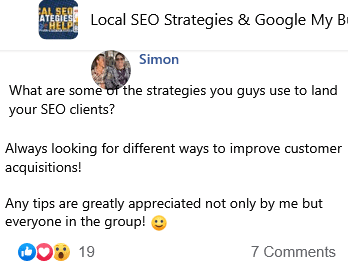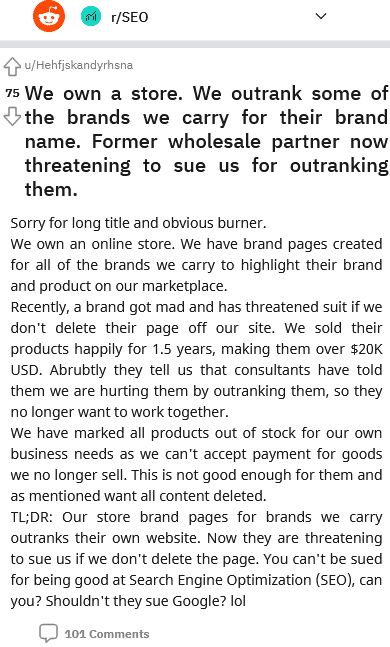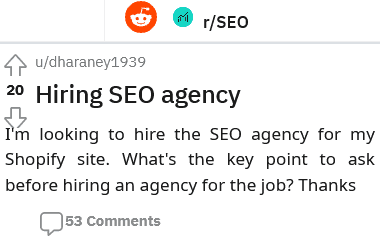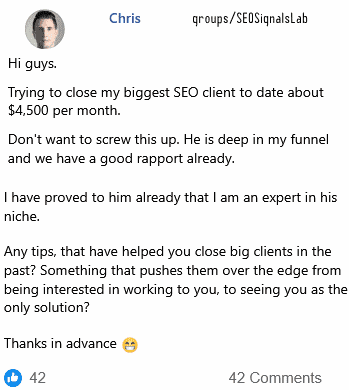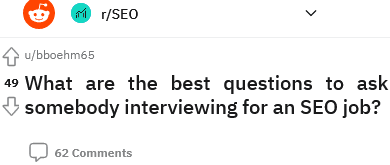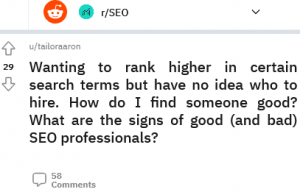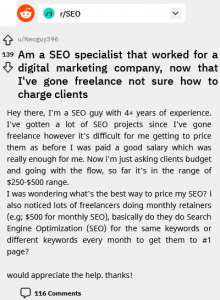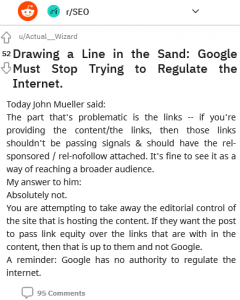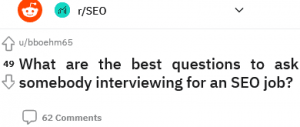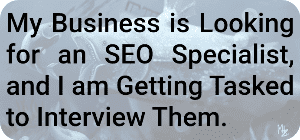I messed up my SEO interview because some of the questions were unexpected. How can I better prepare next time?
So this was for a SEO Strategist position at a world-class agency. I had all the knowledge stored in my brain but there were some questions where I felt like I could have answered better…I don't know if it is due to the fact that I am not a well-spoken person in general but I just had trouble trying to give well-thought, in-depth answers. For some questions that sounded so easy, I just had no idea how to answer them clearly. I felt like my answers were very broad and narrow. It was very frustrating. Some were not even "directly" SEO-related.
For example (I remember exactly how I said it), I was asked, "Can you explain to me where you start with an SEO campaign?" Being so nervous all of us sudden and being stuck on how to go about this question, my answer was, "Umm so yeah, so first, I would look at the website's page titles and make sure they're fully optimized, make sure the overall on-page is set, bolster the content or add new content with target keywords and start building links to strengthen the off-site" (yeah, I got so nervous that I accidentally said off-site rather than off-page) I just felt like I could have gone more in-depth with my answer and it frustrates me every time I think about it.
Another question was, "So Mike, can you tell me how you make use of data in SEO" and I literally had to give myself 10 seconds before giving a very bland answer. I had no idea how to answer this. So I just said, "Um, Data is very important in Search Engine Optimization (SEO) because we want to make sure the traffic is going up, keyword rankings are increasing over time, and increasing our conversion rate percentage. These are all important data that we want to track. So that's why data in SEO is very important".
Another question I remember that I absolutely f'ed up on was, "In the agency you currently work at, how do you work with the paid team and the paid side of things?" and I said, "I don't know, I don't have much Pay Per Click (PPC) knowledge and I rarely interact with the PPC team because it's my manager who mostly communicates with them. I mostly do strictly SEO work and coming up with strategic recommendations in regards to organic."
These were all very difficult questions that I simply couldn't answer thoroughly. Before I walked into the interview I was expecting more straightforward SEO-related questions like "Give me a situation where you would use a 301 re-direct or a 302 re-direct" or "How would you optimize for voice search" or "Explain to me what answer boxes are and why they're important to acquire", etc.
What are some areas I should really concentrate on if I want to make my way up within the Search Engine Optimization (SEO)/Digital Marketing industry? I felt like if the interviewer asked me all questions that were more straightforward about SEO (Especially Technical SEO, like asking about robots.txt, re-directs, sitemaps, etc.) I would have aced it, straight up. But it was clearly the unexpected.
21 💬🗨
📰👈
It's one interview, so don't beat yourself up. It's good that you recognized that you messed up and you're using this as a learning experience. I've interviewed candidates for SEO Managers/SEO Directors who have had worse responses than this. So don't sweat it.
Interviewing is more about selling yourself. Being able to concisely answer interview questions will get you very far. Also you're interviewing with an agency, so keep in mind that they're going to throw curve balls. At some point in agency life you will become a client lead, so it's essential that you're a well spoken individual. You could be an SEO wizard, but if you're not able to communicate then they aren't going to hire you.
Keep interviewing and know that these are typical questions related to SEO interviews. Just be more prepared next time.
Here is how I would've answered the questions:
"How do you start SEO campaigns"
I start by conducting an audit of the entire site. I would look at on-page optimizations (namedrop SEMrush, ScreamingFrog), off-page (looking into backlink profiles, where our links are coming from to get a better understanding of our backlink profile) namedrop Ahrefs /Majectic, and lastly talk about technical SEO – namedrop GTMetrix/Google Page Speed Insights.
How do you make use of data in Search Engine Optimization (SEO).
A data-driven approach will maximize efficiency when optimizing a large site. I would look into which pages are currently driving the most conversions aggressively optimize them. I would continue to move through the list until all pages are optimized. Table non-converting pages until you can audit them and figure out how to make them more valuable. Always be in the pursuit to generate qualified traffic. Here is an ex: we use to rank for a keyword which generated 500 organic visits per month with a < 2% conversion rate. We switched targeting to a lower traffic keyword (somewhere around 200), and it converts at 8%.
How do you work with Pay Per Click (PPC).
PPC is extremely valuable in SEO because you can run test campaigns to determine which keywords have the most value. For example, in e-Commerce SEO, I would work with our Paid Ads Specialist to determine which keywords are driving the most traffic with the highest conversion rate. PPC is essentially buying position zero and can be a great asset when developing a strong organic search strategy.
These are the right answers. SEO campaign starts with an audit.
Good luck next time.
NatashaKvitka
Hi Mike. I really feel for you, job interviews are never easy and especially tough when things go south with unexpected questions.
I would say, though you obviously want to still be focused mostly on SEO, consider broadening your area of interest to all-things digital marketing, just to be prepared for bordering questions like the one you got about interactions with the PPC team.
Just by adding sources like MarTech Today, Marketing Land, Marketing Week, ContentStrategist, Think with Google, Content Marketing Institute to your daily reading list, you will be able to converse in a more confident way on topics that are not directly in your daily working routine.
Other hype topics like big data, Artificial Intelligence (AI) based tools might also arise, so I like to keep myself updated with MIT Sloan review and HBR publications on those. Basically, all the major publications feature some kind of "technology" and "online marketing" sections. They will help you to navigate the landscape.
And being in strategic Search Engine Optimization (SEO) and digital marketing positions myself for years now, I'd say those questions are quite legitimate and you can expect them in the future, as you cannot consider SEO strategies outside of the overall online business development context which includes all scope of marketing channels.
Good luck with your endeavour!
blackswanmx
I feel for you. Just yesterday I had an interview and first question was " I give you $50K, how many sales will you generate in one year with SEO"? Asume you have no previous information or data.
After trying to explain this didn´t work like that, they kept pushing for a number. 200 I said, then next question, how did you get to that number… f*ck!
I don't think you want to work for that company (or at least the person who asked that question). If after you've said it doesn't work like that and they still push you for a number they are probably pushy sales people who will promise the world and likely get the SEO to say a number so they can then blame them if that number isn't hit.
I'd ask the person "If you bought a business that also worked in digital marketing and merged them with this company, do you think you could estimate how much would you make by the end of the first year? You don't know the size of the company you are buying or any of their clients or turnover".
I had a boss tell me once to "maximise visibility on everything". I asked, well there has to be an area to concentrate on otherwise all you are saying is is get more keywords ranked higher with no objective other than that. Then he would want these keyword forecasts which I can see the business reason for estimating where you will be in 6-12 months etc, but he'd then take reasonable projections and suddenly they would no longer be 7-10% YoY increase in revenue, it would be 150% YoY increase etc. That's a bad salesperson and that leads to unrealistic expectations from clients and a shitty working life as the sales person starts to complain at the SEO team for not hitting the crazy lies he's said to the clients.
perasite
In the past I've been hit with this type of question from clients, I ALWAYS explain that I can give them realistic projections for how many people I can out their product in front of but I can't tell them how many if those people THEY can close. My job is to get the horse to the water, their job is to convince it to drink.
greatwhitebuffalo716
Honestly, SEO is such a giganticly broad subject matter that people don't realize because they are usually in a small spectrum of it.
I have to tell my story just as an example. I specialize in running SEO campaigns for Small and Medium Business (SMB)s (small to medium businesses). This involves both local and national campaigns. I am good at ranking the little guy in very competitive markets.
I have worked at 4 SEO agencies including my own. One was small, one was medium and one was huge. So you would think I would have plenty of experience all over the spectrum.
WRONG. When it comes to doing Search Engine Optimization (SEO) for large sites, I don't know where to start. I recently saw the PP presentation for the CanIRank technical SEO presentation at a recent conference. I didn't know a single thing about what they were talking about, and before that, I took pride in what I thought was expert technical SEO knowledge (compared to the peers I've worked with). And I've been in SEO for 5 years.
Similarly, a lot of the guys doing SEO management for large companies with sites that are 2K+ pages long would have no idea how to rank a smaller, more run-of-the-mill site on their own.
TL;DR: SEO is actually a very broad topic, and what you have experience in may be foreign to another experienced member of the SEO industry and vice versa. Don't get discouraged; you're good at what you have experience with, and you will get more experience and learn more about other areas of SEO over time.
semadin
I like to think out loud in interviews. I think much of the time the questions are designed not for you to answer correctly, but so they can see how you think.
Questions like "can you explain to me where you start with an SEO campaign?" are so broad that I think they deserve a little step back and literally saying "well let's take a look at everything we have to deal with, and perhaps ask some questions."
I think you can do this with most interview type questions. Address it as the clouds level before getting down into details (and when talking in the clouds level you can define the parameters for the details so it all makes sense).
After all, if they just wanted to know your level of specific knowledge, they could have you fill out a set of questions and not talk to a person…
bighero76
Great responses, awesome thread.
📰👈
tweez
⮚ "Can you explain to me where you start with an SEO campaign?"
Would start this by asking about the aims of the campaign as this will inform your decision making process on everything else. For example, is the aim to just drive impressions, sales, leads? Then find out who is the target audience. Are they directors in a company, men, women, old, young etc?
Those questions will determine your keywords/topics to focus on. Then from there you can start to talk more about the general SEO technical aspects. You could also mention the need to benchmark and have records of things like keyword positions, titles, URL paths etc. You could say you want to have backups of file paths/titles etc so you can revert to the originals if there is ever a problem. The record of keyword positions/traffic will also enable you to see what has or hasn't worked in the campaign and provides you with the information you need to refine and revise the campaign.
At a larger agency, a lot will be based on recommendations and dealing with huge companies that have lots of bureaucracy. You'll have to write detailed recommendations and provide justifications for your ideas to be implemented. I had a client that needed to go through 3 sets of lawyers before content could be uploaded. It took 6 months for content to be uploaded in total. That's perhaps at an extreme end, but there's often the case when a large company has offices in the US, Asia and Europe. The priorities of one might be different from another and they have a Content Management System (cms) that can only be changed once every few months by their team. You have to show a business reason for your recommendations. It isn't enough to say "change the title tags", you'll need to show why changing something will result in the objectives of the campaign being met. One good way of doing this I've found from experience is basically comparing the company to their largest competitors. So you could say something like "X website is 10 times faster than your site. We recommend the following changes. "
If you can show how a change is likely to result in more traffic/money etc and can create forecasts or models that relate to each change then that will show your potential employers you are thinking about getting clients to buy into your idea and that you've researched things and aren't wasting your time or resources as you've arrived at recommendations based on their specific circumstances.
⮚ "So Mike, can you tell me how you make use of data in Search Engine Optimization (SEO)"
Your answer here generally sounded ok I think. You could talk about competitor data and performing tests so you can refine your campaign and make sure you're on the right track and the SEO is actually providing a return on investment. Specific examples would be good based on what you've done in the past. For example, maybe something like "I used data to analyse how many links a competitor had and which content was driving the links. That analysis was helpful to the team as it we then created content specifically aimed at ranking for a particular keyword group. I benchmarked keyword rankings in SEMrush for this keyword group previously and our new content helped increase the number of first page keywords by x%, it also increased traffic by y% and links by z%
It sounded like the general principles of your answer were ok, but you should relate things like that to what you've personally done. The employer can read generic SEO advice anywhere, they want to see that you have experience, or if not, you at least know the experience that you lack and how you'd go about getting that experience.
> In the agency you currently work at, how do you work with the paid team and the paid side of things?"
This question I would have just come back to the data question again. That Pay Per Click (PPC) and SEO can work very well together in helping determine which keywords convert or meet the campaign objective, this will then allow your PPC team to be more experimental with the budget they do have if you can make sure you are ranking for all keywords that the PPC team are having success with. You could also say PPC and SEO work together in terms of informing decisions about when to target keyword groups based on seasonality etc.
Your answer about PPC and SEO not working together at your agency is fine and honest, but you could also say "that's one of the things I was hoping to do in a new role, I understand how they work together in theory (state the theory behind why they work) and would love to work at a company that offers the chance to become more rounded and understand how all aspects of digital marketing work together.
Just offering my opinion having worked at a quite a few agencies in the UK, but employers at an agency will ask you technical questions at some point, but they want to also know that you can deal with clients, creating proposals, helping with pitches, technical recommendations (and justifying those decisions etc). A lot of work at an agency when dealing with large clients isn't just about the technical aspects of SEO, it's also managing the client and dealing with people and being a part of a team in general. The employer at an agency is definitely going to want to know about that side of things too and not just how much you technically know something. It isn't much use knowing everything about the technical parts of SEO, but a client doesn't implement your recommendations or allow you make the changes yourself as you're not able to give them a reason why they should make the changes beyond "it's good for SEO because everyone says it's good".
Hope the advice above is useful. Feel free to ignore, but having been involved with the hiring process of SEO users in the past, those are the kind of things I would ideally like to see in a candidate. Obviously, it's all dependant on the level you are hiring for, but at the minimum you should always try and relate every answer back to your own experiences. You can talk about failures and things that didn't' work too, you just also need to show how you solved what wasn't working or at least have ideas to solve what isn't working. Hearing generic SEO dos and don'ts isn't giving the best account of yourself if you are actually doing the work. At the minimum you could say "change title tags" I know this because I tested the impact of keywords and synonyms in a title for a campaign and it increased traffic/sales by X".
Half the battle is being passionate and interested in improving though, so it sounds like as long as you keep doing that you'll be fine if you don't get this role and the next one comes up. Good luck anyway.
📰👈
Tedel
mm… They were not easy questions, to be honest. I would have gone for short answers:
Can you explain to me where you start with an SEO campaign?
Gathering information. First, I would like to understand the product(s) or service(s) that this client sells and who are their target market(s) and heavy user(s). Then, I would run a full analysis of both the website and its SEO situation.
So Mike, can you tell me how you make use of data in SEO…
Depending on the data. Traffic data, for example, allows me to check how we are converting. Competitors' data, on the other hand, allows me to see which way they are moving to see what would be my next move.
In the agency you currently work at, how do you work with the paid team and the paid side of things?
I let my manager take care of the bills and I concentrate in making the arrangements. (With this answer, I would have taken the money issue out of the conversation.)
Just my 0.02.
henrykene
The first question actually, could've been simply answered by saying this, "firstly, to start an SEO Campaign, you need to analyze the exact niche market and study the opportunities that you can use to rank by using the keywords that doesn't have much competition if the whole research is for a new website."
The second question about how to handle SEO data is simply asked to know if you really know where to use those data had it been they're going to be doing the niche research by themselves and pushing the already research refined data to you. They just want to know if you knowledge on how to implement SEO data if you're giving one.
I will suggest you go back and start reading to fully upgrade your knowledge on this topic because it's very big than you can imagine. How i wish i was the one they invited for the interview, i would've nailed it straight up. Goodluck though
iKnowSearchEngines
Hi man don't stress about it you did your best! You should be glad you can criticize yourself it means you're learning and next time you'll get it better.
Remember that most of the times nobody cares about your exact technique. Try to explain whatever you're doing as simple as you can do that even a 5 year old would understand your thought process.
For example: Q – how should you start an SEO campaign? A – well… I know SEO has 3 different aspects. On, off page and technical side to it. Depending on the website and business goals I would focus on the less developed aspect of the given website / page and start my strategic thinking and focus my entire plan around it. For example if your website is highly optimized but outranked by competitors with great off page – I would go research and blah blah blah to get more traffic, more blah and rise the bottom line because I believe that blah blah.
Talking as simple as you can, building your arguments as slowly as you can will make the real difference in future interviews.
glanshruber
Hi Mike, I'm also a Mike who's been in this sitch.
The fact of the matter is that they're interviewing for a strategist role, not a raw SEO role. What they were looking for was evidence that you can work plan and lead SEO campaigns that support the wider brand's marketing/success.
It sounds like you were preparing questions that are about the implementation of SEO work. If they're interviewing you, they likely already believe you know how to use a redirect or write a page title.
The questions that are not about SEO are about wider marketing strategy, and your ability to link your marketing activity with other departments or partner agencies, and the client's business objectives.
For working with Pay Per Click (PPC) I'd personally think about how PPC and SEO interact. Could they bid more aggressively on terms the site doesn't currently rank well for? Could you share keyword data, or work together to find products that convert well in paid, and focus your organic efforts on these to improve Return of Investment (RoI)? Could you consider buying extra traffic to pages you're doing Conversion Rate Optimization (CRO) for to speed up tests?
I think on the question of starting a campaign, you sound like you leapt into talking about doing the work. What they'll have wanted to see here is a) how you would determine what work is the best work to do? Don't just leap in and 'do SEO' on a site. Do the right/smart SEO.
b) how aware you are of the commercial impact of your work. You need to discuss the business objectives; what do they want to achieve? What is their current challenge? What are their competitors up to? What are they spending money on elsewhere that you need to support? What mix of work do they need to make their bottom line improve?
You can run in, do Search Engine Optimization (SEO), improve page ranking and not make any money. A strategist needs to make sure SEO makes changes in the right places, in the right way.
It sounds like you need to think more about things beyond the SEO. Think about why you do what you do, and how every channel can work together with you. Think about why the business needs you to do that.
Tuilere
One issue I see is that your answers – and many people's suggested alternatives – are extremely tactical.
A Big Agency does not want you to start at "is it optimized" or "write title tags." The first step for big agencies is going to be overall business goals, role of website, Key Performance Indicators (KPI)s. You optimize to KPIs. And a big agency is going to want someone who can work with the strategists to decide what reasonable KPIa are and timelines and expectations.
You are oriented to tactics. you need to step back and start thinking why each tactic is worthwhile and when. You need to connect SEO to the business.
You will not "make your way up" as a slinger of title tags.
Actual__Wizard
"Give me a situation where you would use a 302 re-direct"
That's a troll question if I've ever heard one.
I would have asked, "Since were talking about SEO, you mean a 307, correct?" and this is why I don't bother with interviews. A 302 just means "found", it's not suppose to be used as a temporary redirect. It's more a relic from http 1.0 that was left in for compatibility reasons.
Your options for a valid redirects are:
301 – permanent
307 – temporary
303 – not something most SEO users are concerned with, web developers, sure.
The biggest thing with a 301 is that it's suppose to be a permanent redirect, as in once you set it up, it's done forever. Browsers will cache 301s so you have to make 100% certain that you really want to do a permanent redirect.
307s Should only be used to benefit users (server1 down so 307 to server2) or are doing something like split testing (that's really not what it's for, it's fine if the traffic source is ads or email though.) Whatever it is, the best practice there would be that it's, you know, a temporary thing. 😀 This should be avoided in most situations. It's always better not to change URLs and if you must, it's better to do it permanently and not create chains of 301s in the process.
I've seen sites where they migrated from http to https, then they eliminated the "www" out of their domain, then they got rid of the categories in URLs, and they moved certain pages to different URLs. Dude, that's a giant mess of 301s. That's not how that's suppose to be done.
📰👈
The Fate Of an SEO Intern Ends Up Doing Lots of Roles!
A Freelancer Ended Up Wanting to be a part of a Company Team
An Agency Said 7 Niches Contains Most Clients: Dental, Eye Care, Hospitals, SaaS, Education, Finance, and Cannabis!
Discussion about Percentage or Partial Ownership of a Business
When Did You Think that SEO Scams?




